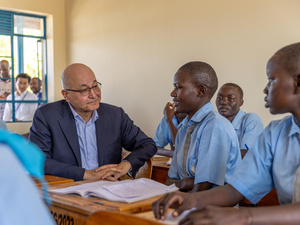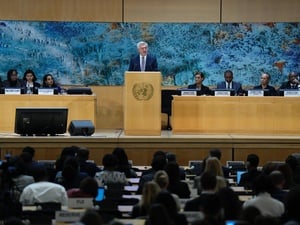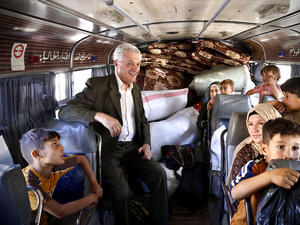Global Refugee Forum Opening remarks of the UN High Commissioner for Refugees, Filippo Grandi
Global Refugee Forum Opening remarks of the UN High Commissioner for Refugees, Filippo Grandi

Your Majesty,
Distinguished participants in the Global Refugee Forum,
Figures do not tell real stories. But there is one figure — 114 million — which is important to begin our reflection: 114 million represents the number of refugees and displaced people whom persecution, human rights violations, violence, armed conflict, serious public disorder have forced from their homes: 114 million shattered dreams, disrupted lives, interrupted hopes. It is a figure that reflects a crisis — in fact many crises — of humanity. However, it also represents the generosity and hospitality of the people who open their hearts and homes to those fleeing. People who often have as little resources as those who had to leave everything behind.
But our world is also threatened by profound inequalities, widespread poverty and climate change; security is a physical and virtual concern; and COVID-19 has revealed how exposed we are to health hazards. It is therefore easy to sometimes forget that forced displacement also remains an unresolved problem that concerns us all, and not only when we see images of massive flows or when refugees knock at our doors. And which — like other global challenges — is made more difficult by an increasingly divided international community.
Let therefore refugees not be forgotten amidst the multiplicity of other challenges, some of which may appear bigger, and more urgent: 114 million people is as big and as urgent as it gets. This is why this Global Refugee Forum is timely: because it is an opportunity for all of us to re-commit to some basic actions needed to respond to forced displacement: protecting people forced to flee, and sharing the responsibility of those who host them; ensuring that refugees are empowered to contribute to communities and nations that give them refuge; redoubling efforts to resolve their exile; and striving to tackle the root causes of their flight.
Your Majesty,
Ladies and gentlemen,
A major human catastrophe is unfolding in the Gaza Strip and so far the Security Council has failed to stop the violence. The events that have occurred in Israel and Gaza since 7 October are outside the mandate of UNHCR. Tragically, however, we foresee more civilian deaths and suffering, and also further displacement that threatens the region. I cannot open the Global Refugee Forum without first echoing the call of the United Nations Secretary-General for an immediate and sustained humanitarian ceasefire, the release of hostages and the resumption — finally — of a genuine dialogue that once and for all ends the conflict and brings real peace and security to the people of Israel and Palestine. I have invited my colleague and friend Philippe Lazzarini, Commissioner-General of the United Nations Relief and Works Agency, UNRWA, to deliver special remarks this afternoon from the perspective of the agency mandated to assist and support Palestine refugees and therefore most closely engaged in the humanitarian response in Gaza.
But while a strong focus remains and must remain on Gaza, I have a plea: please do not lose sight of other pressing humanitarian and refugee crises. The situation of civilians in Sudan and in Ukraine, including millions who are refugees and displaced, demands our attention and support, as do protracted crises like the plight of the Rohingya, the Syria situation, Afghanistan, the ongoing struggles in the Democratic Republic of the Congo, the growing insecurity in the Sahel, the dramatic population flows across the Americas, the Mediterranean and the Bay of Bengal, and many others.
Most of these crises, as we all know, persist because of the lack of political solutions to conflicts – the inability to make peace — by parties to the conflicts and by states with influence, increasingly combined with climate change and other emergencies. All this leaves ordinary citizens exposed to terrible hardship, to human rights violations, to displacement. In these situations, we must therefore not — at the very least — neglect our core obligation to humanity and ensure the provision of protection and basic humanitarian assistance. I would be remiss if I did not mention that many humanitarian organizations are facing severe funding challenges: UNHCR alone is lacking US$400 million to end the year with the minimum of needed resources, a shortfall we have not experienced in years; and we are all looking with much concern at 2024. Let me take advantage of this moment, and of the presence of many generous donors, to make the strongest appeal that you reinforce your financial support. Because the state of the world is such, unfortunately, that we need – you need – strong humanitarian organizations.
Your Majesty,
Ladies and Gentlemen,
As we concluded the first Global Refugee Forum four years ago, I said that we had ‘the makings of a success.’ Today, those ‘makings’ have turned into an engine which can bring us much further, thanks to the concerted effort of so many here in this room and beyond — states of course, but also national and international NGOs, local and refugee-led organizations (and refugees themselves, including the more than 300 who are participating in this Forum), but also sports bodies, international financial institutions, faith leaders, academia, private companies and citizens who have all contributed what they can, in the positive, “whole-of-society” spirit that is a hallmark of the Global Compact on Refugees.
For this, let me thank you.
And let me thank our co-host Switzerland for its strong support to this cause.
I would like of course to express much sincere gratitude to the co-convenors – Colombia, France, Japan, Jordan, and Uganda - for their leadership, guidance and diligence in preparing this Forum, but even more so for your steadfast solidarity with refugees over many years, as hosts or donors.
I would be remiss if I did not — and most specially — thank you, Your Majesty, not only for honouring us with your presence today and for your forthcoming Keynote Address, but also for the Hashemite Kingdom’s longstanding hospitality for refugees, which I have had the privilege to witness and admire for many years, in my own service to UNRWA and in my current capacity. Not just those from Iraq and Syria in recent decades, but also Palestine refugees since 1948.
It is no coincidence that Jordan, Colombia and Uganda are co-convenors. They represent host countries – major host countries – which have – sometimes for decades, often with little outside support — sheltered, protected, and helped refugees. The preamble to the 1951 Refugee Convention explicitly calls on international cooperation to alleviate, I quote, “unduly heavy burdens” represented by “the grant of asylum”. One of my strongest messages to you today is precisely the following: we cannot overstate the role that host countries and communities play in saving lives, and we must never forget the price that they pay — on behalf of us all — as they deliver this global public good.
The Global Compact on Refugees, affirmed by the United Nations in 2018 and the foundation of this Forum, was designed with precisely the objective of pursuing greater burden and responsibility sharing in refugee matters. True, in some places we have seen actions aimed at precisely the opposite, violating international law or pushing refugees back, building legal or physical walls, or outsourcing responsibilities; policies that by the way are both wrong and ineffective. And we cannot sugarcoat the fact that many of the most vulnerable refugees and host countries and communities have not received the support that they require and deserve.
But it is important to recognize that despite all of the challenges, we have indeed made much progress; progress achieved by working together.
Progress made through large multilateral commitments, as well as regional initiatives, like those of the three (and soon to be four) Regional Support Platforms. Progress also in countless other initiatives by people determined to improve the lives of refugees and their hosts.
Progress in advancing refugee self-reliance, reducing aid dependency, pursuing third-country solutions, and improving conditions for voluntary return through more than 1,700 pledges in the first Forum by some 130 states and 550 non-state entities.
Progress led by host countries that have adopted policies that not only provide access to territory and safety, but also to education and health services, or in some cases, their own land — at least until refugees can find durable solutions, in particular by returning home in safety and dignity. Many States have enabled freedom of movement within their country and access to employment, expanding opportunities.
Progress furthered by those donors that have understood the importance of supporting these efforts by helping strengthen national services in host countries, finance infrastructure and job opportunities, which can boost both refugee self-reliance and the host country’s GDP, while reducing the cost of inclusion in national services.
We must not, however, take the generosity of host countries for granted. Let’s remember that most refugees – 75 per cent to be precise – are hosted by low and middle income countries, often already struggling themselves to provide and care for their own citizens.
This is why international support is so key and must be reinforced.
I would like to thank the World Bank for continuing to be a leader in this regard and a true partner to UNHCR and refugee hosting countries. But it is also others – like the regional development banks in Africa, Asia, the Middle East and the Americas, who have done so much, as too have bilateral development donors, like Japan and France who here represent themselves and many other committed donors: and I would like to appeal to other countries with resources to join their ranks. In addition to humanitarian aid, billions of dollars in development assistance have been unlocked in the past years for refugee hosting countries and communities – money that, in the absence of the Compact and the determined work of so many of you, would not have materialized.
The private sector has also become a fundamental partner, not just through philanthropic contributions (which last year comprised an unprecedented 20 per cent of UNHCR’s income), but also in the way it has brought its own expertise to refugee responses, with much needed resources, innovation, mentorship, employment, their own voice and so much more.
Third country solutions have also grown with increases in resettlement and so-called ‘complementary pathways’: scholarships, labour mobility pathways, and other life changing opportunities that help refugees and are a clear demonstration of burden and responsibility sharing; one that must continue and be significantly scaled up.
Last but not least, in these past four years, UNHCR has pressed for more work to be done in countries of origin of the refugees. In some places, where political progress has been limited, this has generated difficult discussions with some of our stakeholders. I appreciate the different positions and the politics involved in this often-delicate process. Yet, we will continue to push for solutions. Not only because it is part of the mandate that states have tasked UNHCR with. Not only because it is a pillar of the Global Compact on Refugees. Not only because host countries demand, pressingly, progress in this area.
But because the single greatest wish of almost every refugee is to go home, voluntarily, in safety, and with dignity.
But the reality is that we — that you, states — are simply not doing enough to remove the obstacles to return, which are also the roots of further displacement. To achieve this, more must be done to achieve peace. Because humanitarian organizations, like UNHCR and many others represented here, can only do so much if conflict, violence, and persecution persist.
Your Majesty,
Ladies and Gentlemen,
This week we celebrate the 75th anniversary of the Universal Declaration of Human Rights. Here, today, I believe it is appropriate to recall that if its third article was upheld always, and in all places — and I quote it, ‘Everyone has the right to life, freedom and the security of person’ — there would be no refugees.
So, in these troubled times, and amidst so many divisions, here is my strongest appeal: let us make this Global Refugee Forum a moment of unity, in which all of us join forces to ensure that those who flee because their life, freedom and security are threatened can find protection; and that everything is done to resolve their exile as soon as possible.
Thank you.






